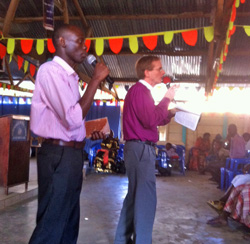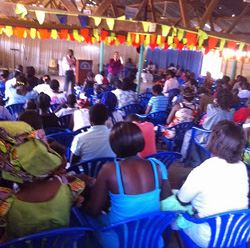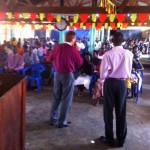I arrived at three in the morning, Kampala time. After a couple of hours’ sleep, I was up and dressed and on my way to church in Namuwongo. This is fairly typical of the urban slums in East Africa: small earthen huts with corrugated iron roofs jammed together, sewage running in ditches through narrow alleys, children everywhere, garbage everywhere. The walk from the main road to the church takes about five minutes, unless you are Pastor Wilson Opio.
 Pastor Wilson is in charge of Namuwongo Revival Church, a Pentecostal congregation he founded in 1993. On Sunday mornings, he dresses in an immaculate dark suit, white shirt and bright tie, his shoes polished, and he walks through the mud and the garbage to the church. The trip takes him easily a half-hour. People come out of their homes to greet him. He stops to talk with nearly everyone he meets, including several small children, shakes their hands, asks how they are doing, sometimes lays hands on them and prays for them. Today he is in Rwanda on mission, so I am walking with his assistant, Brother William Omara. Even though we take our time, it takes seven minutes. People are polite as we pass, but they do not give us their hearts as they do Pastor Wilson. They do not know me, but they all know him.
Pastor Wilson is in charge of Namuwongo Revival Church, a Pentecostal congregation he founded in 1993. On Sunday mornings, he dresses in an immaculate dark suit, white shirt and bright tie, his shoes polished, and he walks through the mud and the garbage to the church. The trip takes him easily a half-hour. People come out of their homes to greet him. He stops to talk with nearly everyone he meets, including several small children, shakes their hands, asks how they are doing, sometimes lays hands on them and prays for them. Today he is in Rwanda on mission, so I am walking with his assistant, Brother William Omara. Even though we take our time, it takes seven minutes. People are polite as we pass, but they do not give us their hearts as they do Pastor Wilson. They do not know me, but they all know him.
 A few years after the church was founded, Pastor Wilson began a local outreach, simply visiting door-to-door, asking after people’s needs, inviting them to church, praying for them. More than once members of his team came upon traditional “medicine men” invoking spells upon young girls in the house. These spells were not for the healing of malaria or for their protection. They were spells promising to make the girls more attractive to the wealthy men who came from outside the neighborhood to buy the children for an hour or two. When Wilson first told me this story, he shook his head and said, “The desperation of poverty can drive people to do terrible things.” I never heard a word of condemnation from him in regard to the families caught up in this: only compassion and a righteous determination to do something about it.
A few years after the church was founded, Pastor Wilson began a local outreach, simply visiting door-to-door, asking after people’s needs, inviting them to church, praying for them. More than once members of his team came upon traditional “medicine men” invoking spells upon young girls in the house. These spells were not for the healing of malaria or for their protection. They were spells promising to make the girls more attractive to the wealthy men who came from outside the neighborhood to buy the children for an hour or two. When Wilson first told me this story, he shook his head and said, “The desperation of poverty can drive people to do terrible things.” I never heard a word of condemnation from him in regard to the families caught up in this: only compassion and a righteous determination to do something about it.

Today, the spiritual condition of the neighborhood has changed. The witch doctors are not around much. The church itself draws about 100 people for the early service and about 250 for the second service, but the spiritual impact of the ministries here goes well beyond the doors. I have said that the presence of the church consecrates the whole neighborhood or town; I know it is true here, just as it is true in Pittsburgh. It is easy to forget this among all the work that piles up on my desk. And yet, I know if I could learn to believe this with my whole heart, pray to remember it every day, it would change my ministry as a bishop and our ministries together as parish churches.
The NRC building is nearly indistinguishable from the houses around it, except that it has an assembly hall with a concrete floor. This morning it is packed. Today is Women’s Sunday, an event that happens four or five times a year, celebrating women’s ministries. I had been informed about two hours earlier that I would be preaching, and about five minutes earlier, that this should be my theme. Welcome home to Africa!
 So I got up near the end and taught on Mary Magdalene and the Resurrection. With simultaneous translation into Luganda, I asked why in John, the Risen Lord should have appeared to the men three times, but to Mary only once? I said that what it took the disciples three appearances to take in, Mary got in one dose, because she had been prepared for it. I think the hearts of the women in the Gospels were more deeply prepared by the grace they received to look on the Resurrection with open minds. You never hear them talking about “who is the greatest” or asking Jesus to let them “sit at his right hand and at his left.” With the exception of the famous Mary v. Martha moment, their trust in and affection for their Lord is apparently constant, appropriately reflecting the grace He has poured upon them. And Mary Magdalene’s steadfast waiting at the empty tomb, with the mystery of where her Lord has gone, shows this love. And the Risen Christ in response bestows two wonderful things on her: the first is the dignity of being a fellow disciple with the missing “brothers” and the second is the mission of being the first evangelist of the Resurrection. Love, dignity, and mission: these three things are at the center of the women’s’ ministries I have seen in Uganda, and so I told the story of the way my own mother gave me these things as my first and best teacher in the Lord. I encouraged them to know that their prayer and their work can change an entire generation for good and has an impact on many people they may never even meet. At the end I blessed them, as they asked, but the blessing was mine.
So I got up near the end and taught on Mary Magdalene and the Resurrection. With simultaneous translation into Luganda, I asked why in John, the Risen Lord should have appeared to the men three times, but to Mary only once? I said that what it took the disciples three appearances to take in, Mary got in one dose, because she had been prepared for it. I think the hearts of the women in the Gospels were more deeply prepared by the grace they received to look on the Resurrection with open minds. You never hear them talking about “who is the greatest” or asking Jesus to let them “sit at his right hand and at his left.” With the exception of the famous Mary v. Martha moment, their trust in and affection for their Lord is apparently constant, appropriately reflecting the grace He has poured upon them. And Mary Magdalene’s steadfast waiting at the empty tomb, with the mystery of where her Lord has gone, shows this love. And the Risen Christ in response bestows two wonderful things on her: the first is the dignity of being a fellow disciple with the missing “brothers” and the second is the mission of being the first evangelist of the Resurrection. Love, dignity, and mission: these three things are at the center of the women’s’ ministries I have seen in Uganda, and so I told the story of the way my own mother gave me these things as my first and best teacher in the Lord. I encouraged them to know that their prayer and their work can change an entire generation for good and has an impact on many people they may never even meet. At the end I blessed them, as they asked, but the blessing was mine.
Pastor Wilson is the spiritual father of Pilgrim Africa. It was through the ministry of this church, at the height of the Lord’s Resistance Army insurgency in 2001, that the founders received their original vision and call to bring food and medical supplies to hundreds of thousands of people living in refugee camps behind rebel lines. Wilson has been on the board of Pilgrim from its inception, praying for the work as we shifted to resettling the displaced back in their villages, teaching sustainable agriculture techniques, sending mobile health clinics into the villages, building a school for former child soldiers, and planning a university. Though he is sometimes busy with the 27 churches he has planted across the country, his prayer continues to shape and strengthen all our lives, even now as we begin to launch a comprehensive anti-malaria protocol that could impact the entire country.
It is no wonder that his people call him Bishop Opio. If, in the next ten years, I can become half the bishop he is, I will consider my ministry to have been blessed beyond all measure.
